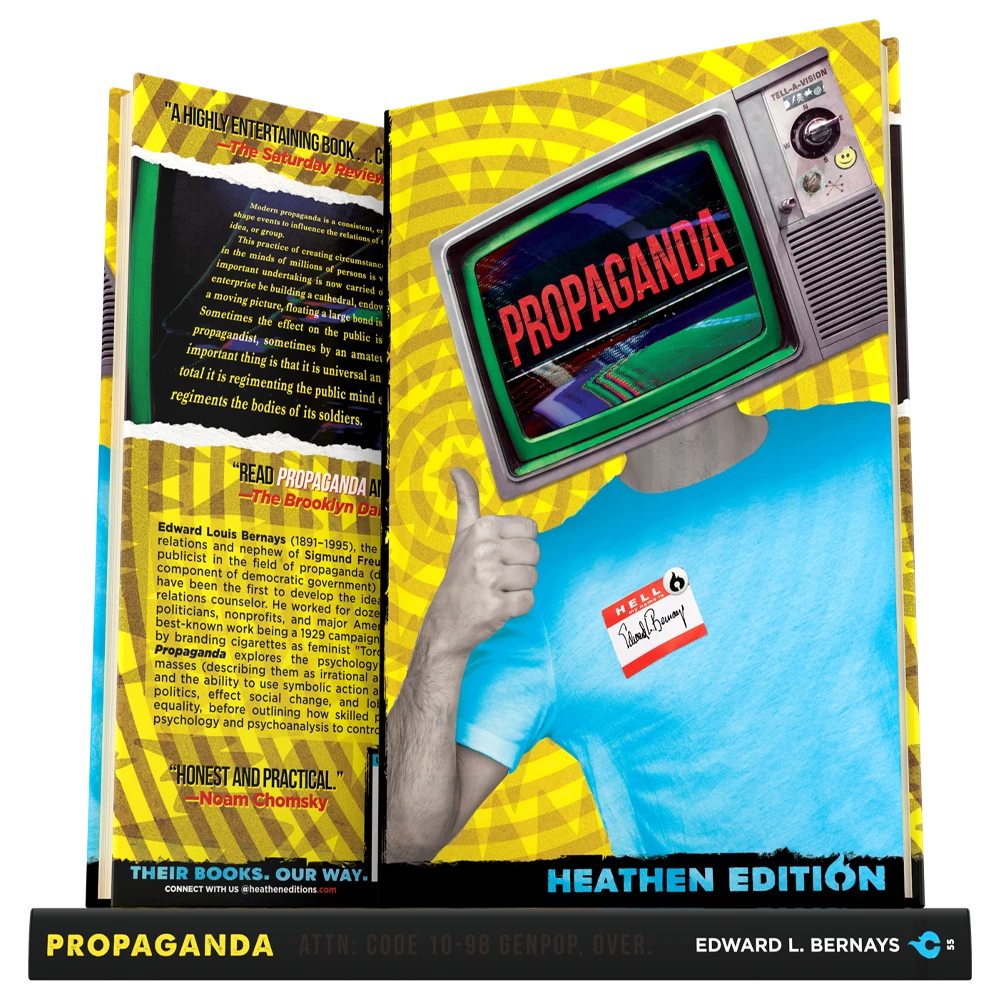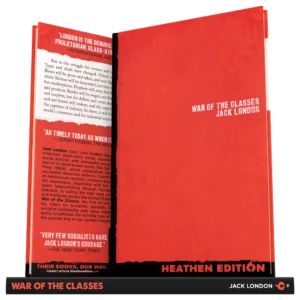No products in the cart.

Propaganda
Spine #55
Author
Edward L. Bernays
Translator
First Edition
1928
Heathen Edition
November 22, 2024
Refreshed
Pages
188
Heathen Genera
Propaganda
Paperback ISBN
978-1-948316-55-2
Hardcover ISBN
978-1-963228-55-7
Modern propaganda is a consistent, enduring effort to create or shape events to influence the relations of the public to an enterprise, idea, or group.
This practice of creating circumstances and of creating pictures in the minds of millions of persons is very common. Virtually no important undertaking is now carried on without it, whether that enterprise be building a cathedral, endowing a university, marketing a moving picture, floating a large bond issue, or electing a president. Sometimes the effect on the public is created by a professional propagandist, sometimes by an amateur deputed for the job. The important thing is that it is universal and continuous; and in its sum total it is regimenting the public mind every bit as much as an army regiments the bodies of its soldiers.
Edward Louis Bernays (1891−1995), the recognized father of public relations and nephew of Sigmund Freud, was a pioneer American publicist in the field of propaganda (describing it as a necessary component of democratic government) and generally considered to have been the first to develop the idea of the professional public relations counselor. He worked for dozens of government agencies, politicians, nonprofits, and major American corporations, with his best-known work being a 1929 campaign to promote female smoking by branding cigarettes as feminist “Torches of Freedom.” His book Propaganda explores the psychology behind manipulating the masses (describing them as irrational and subject to herd instinct) and the ability to use symbolic action and propaganda to influence politics, effect social change, and lobby for gender and racial equality, before outlining how skilled practitioners can use crowd psychology and psychoanalysis to control the masses in desired ways.
Test Your Might
Paperback
OTHER RETAILERS
Rate & Shelve It
Hardcover
OTHER RETAILERS
Rate & Shelve It
"Read Propaganda and find out."
The Brooklyn Daily Times
Heathenry
Contents
Praise
Details
Heathenry
Here’s how strongly we feel about this book: while we would prefer that you read our edition, we believe that you should read whatever version you can readily locate because its contents are too important to understanding the world as it currently exists around us. No matter what world media you’re currently consuming, it’s all propaganda of some type and Propaganda details the how and why of its utilization by persons, entities, societies, corporations, politicians, governments, countries . . . In short, if you’re receiving a message — from Reddit to X, from the Oval Office to the Kremlin, from YouTube to TikTok — it’s all propaganda, and once you possess the knowledge this book proffers, you become aware of its real-time utilization all about you — as if with each new headline or breaking story the groups listed above simply work down the propaganda checklist, ticking the boxes as they go.
Here is a transcribed excerpt from a recent phone conversation we had with our friend(s) who designed this edition:
Heathen Editions: —so, Watson Thomas, how are you?
Watson Thomas: Are you really calling us that?
HE: You said to call you whatever we want!
WT: How long before people realize you named us after your cats?
HE: Them cats straight out of the bag, now, I guess.
WT: (laughs)
HE: We have to know, what inspired your approach to this cover artwork and book design?
WT: One of your footnotes.
HE: Stop. Really? Which one?
WT: The one where you mention Netflix in The Nine Unknown.
HE: Oh, yeah! Hold on . . . (book opens, pages flip) in the Heathenry?
WT: Yep.
HE: (reading) Fun fact: Edward Bernays is the great-uncle of Marc Bernays Randolph, the co-founder and first CEO of Netflix.
WT: That’s the one.
HE: That fun fact takes on a whole new meaning after reading Propaganda.
WT: It sure does! 260 million paid subscribers is a lot of eyeballs; availability in 45 languages is a lot of ears. It’s like one of those credit card commercials: “Getting paying subscribers to binge your propaganda: Priceless.”
HE: (laughs)
WT: Or maybe those subscribers paying actual money to binge propaganda on more than one platform is priceless?
HE: Speaking of binging propaganda, have you seen The Century of the Self?
WT: Yes, but only after you mentioned it.
HE: You were supposed to say no, so I could say it’s a four-part 2002 BBC documentary by filmmaker Adam Curtis, detailing the life and times of Edward L. Bernays. I can absolutely assure you that loud expletives could be heard echoing throughout our holler as I watched it. I found Part Two especially eye-opening and thoroughly enraging.
WT: Yep, everything changes when you learn about Bernays’ involvement with the 1954 Guatemalan coup d’état.
HE: It’s superhero-level evil–—
WT: It boggles the mind that the dude can spend the entirety of Propaganda preaching its necessary place within a democracy, then take a cash-money-paying “public relations” job, from what is now Chiquita, convincing the entire world that Guatemala’s democratically-elected president was actually a communist, “And, why yes, Dulles brothers,1Don’t know them? Read The Devil’s Chessboard: Allen Dulles, the CIA, and the Rise of America’s Secret Government by David Talbot, and The Brothers: John Foster Dulles, Allen Dulles, and Their Secret World War by Stephen Kinzer. I will help you, too!”
HE: Key takeaway from Propaganda?
WT: That it doesn’t matter if you’re white or black, white collar or blue collar, Democrat or Republican, American or Russian — or whatever — you have been fed a steady, hearty diet of propaganda by the dump-truck load on the daily, every single day, since you were born.
HE: Hm. There’s definitely something to be said about our acclimation to propaganda as a species.
WT: Which leans into “the greatest trick the devil ever pulled” territory. What’s your key takeaway?
HE: That it’s a playbook being utilized by both our allies and our enemies, and when you know how propaganda is enacted, you see it everywhere, from Buckingham Palace to the Mexico border.
WT: . . . from sea to shining sea.
HE: You ready for the Propa?
WT: Hell yeah.
HE: So, Papa, you got a dope rhyme to throw down to warn these readin’ cats what it is they’re about to experience?
(analog radio searching sounds)
Contents
Heathenry: Thoughts on the Text
Propaganda
Propaganda
Praise
“A highly entertaining book . . . copiously documented.” —The Saturday Review of Literature
“The only difference between propaganda and education, remarks Edward L. Bernays, is in the point of view. ‘The advocacy of what we believe in is education. The advocacy of what we don’t believe is propaganda.’” —George Sylvester Viereck, Spreading Germs of Hate
“It’s a curiosity whether Bernays is being disingenuous or simply naive in his sunny conclusions.” —medium.com
“Read Propaganda by Edward L. Bernays and find out.” —The Brooklyn Daily Times
“Bernays’ honest and practical manual provides much insight into some of the most powerful and influential institutions of contemporary industrial-state capitalist democracies.” —Noam Chomsky
“He has grasped the ‘bull by the horns,’ boldly titled it Propaganda, and then with all the vigor of his craftsmanship attempted to give the fine old word its proper desserts.” —Salt Lake Telegram
“He . . . misses entirely the fact that the close connection of the word [propaganda] with the activities of the Roman Catholic Church may have affected its connotations with the rural, Protestant majority of the American public.” —Sales Management and Advertisers’ Weekly
“Mr. Bernays’ impressive reference to colleges, churches, and other national agencies now employing propagandist methods for worthy ends only tends to substantiate my contention that we are living at a time when the very most sacred, rare, and hitherto carefully guarded treasures of civilization are obliged to turn to ballyhoo and sell caricatures of themselves to opened-mouthed idlers in the marketplace.” —Everett Dean Martin, The Forum
Details
Propaganda
Heathen Edition #55Published: November 22, 2024
Format: Paperback
Interior: Black & White on Cream Paper
Pages: 188 (+2 POD)
Language: English
Annotations: 200 Footnotes
Illustrations: 4
You might dig these, too!
The Heathen Newsletter
Want to be kept in the loop about new Heathen Editions, receive discounts and random cat photos, and unwillingly partake in other tomfoolery? Subscribe to our newsletter! We promise we won’t harass you – much. Also, we require your first name so that we can personalize your emails. ❤️
@heatheneditions #heathenedition
Copyright © 2026 Heathen Creative, LLC. All rights reserved.

